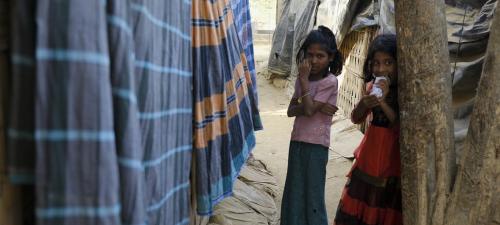Grievous violations continue against Myanmar civilians, Human Rights Council hears
Marginalized communities in Myanmar still face “grievous human rights violations” at the hands of security forces, a UN-appointed independent expert said this week, while repeating her call for an international and independent probe into the 2017 exodus from Rakhine state.

Bangladesh. Rohingya refugees who fled Myanmar to safety in Cox's Bazar.
Addressing the Human Rights Council in Geneva, Yanghee Lee warned that the international community is “beginning to overlook” the plight of hundreds of thousands of people who fled the country amid violence described as ethnic cleansing.
“So long as impunity for alleged atrocity crimes prevails, we will continue to bear witness to flagrant violations of rights perpetrated against ethnic minority populations in the name of counterinsurgency, entrenching grievances and prolonging insecurity and instability,” she said.
In a wide-ranging update to the 47-Member forum in Geneva on Tuesday, the Special Rapporteur implored the Council to maintain pressure on Myanmar’s Government, amid concerns about possible war crimes in Rakhine State, the treatment of minorities, the environment and freedom of expression.
Less than two years ago, more than 700,000 ethnic Rohingya – who are mainly Muslim – were driven from Rakhine State, seeking shelter in neighbouring Bangladesh, Ms. Lee explained.
At the time, former UN High Commissioner for Human Rights Zeid Ra‘ad al-Hussein told the Human Rights Council that the episode was a “textbook example of ethnic cleansing”.
Today, around one million Rohingya refugees live in Cox’s Bazar where they “are subject to a human rights crisis, responsibility for which lies with Myanmar”, Ms. Lee insisted.
While maintaining that it was also Myanmar’s responsibility “to bring about all necessary conditions for all the people they forcibly drove out to return…they are entirely failing to do so”, she said.
At the same time, the remaining Rohingya in Myanmar “continue to be denied their rights and are persecuted by authorities” the Special Rapporteur continued, “making returns from Bangladesh impossible”.
Repeated her call that the situation of Myanmar’s Rohingya exiles be referred to the International Criminal Court, or that an independent tribunal be set up in which perpetrators of international crimes can be tried, she appealed to the UN Security Council to put their “differences” aside and unite in relation to Myanmar by coming out with “a strong resolution”.
“The situation is not improving, and serious violations continue to take place on a regular basis.”
Myanmar ambassador says allegations 'groundless'
Speaking at the Council, Myanmar's Ambassador Kyaw Moe Tun insisted that the Rakhine situation had been an “utmost priority…since day one”.
The country had been ready to take refugees back from Bangladesh since January 2018, he said, appealing for recognition of the Government’s “genuine and concerted efforts for enabling repatriation”, instead of “naming, shaming and pressuring the country based on groundless allegations”.
On other issues, including the freedom of expression, the Ambassador maintained that there was no restriction on the use of internet and social media – as reported by the Special Rapporteur just last week in a Rohingya township - “but we need to strike a balance between security and freedom, rights and responsibilities”.
He added: “Democracy, and respect individual rights, together with the rule of law are the vehicles by which Myanmar will escape poverty and achieve the prosperity our people seek and desire.”
Source:UN
- 345 reads
Human Rights
Ringing FOWPAL’s Peace Bell for the World:Nobel Peace Prize Laureates’ Visions and Actions

Protecting the World’s Cultural Diversity for a Sustainable Future

The Peace Bell Resonates at the 27th Eurasian Economic Summit

Declaration of World Day of the Power of Hope Endorsed by People in 158 Nations

Puppet Show I International Friendship Day 2020

